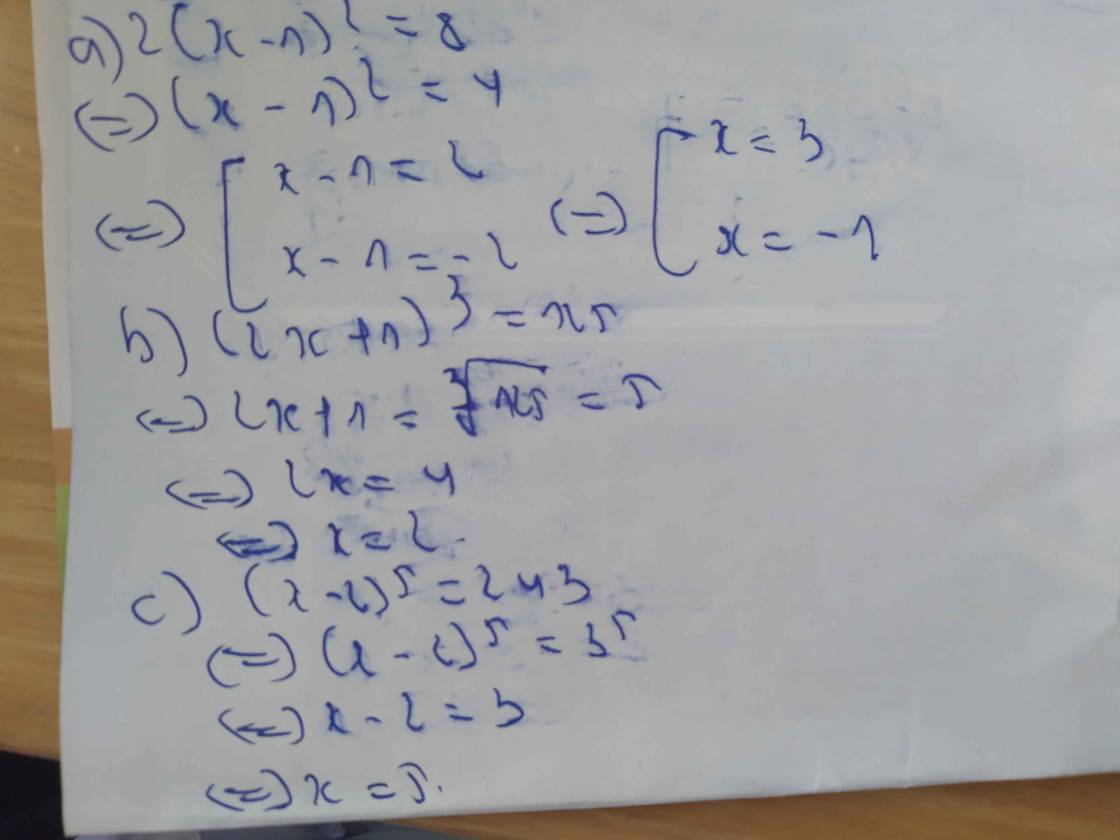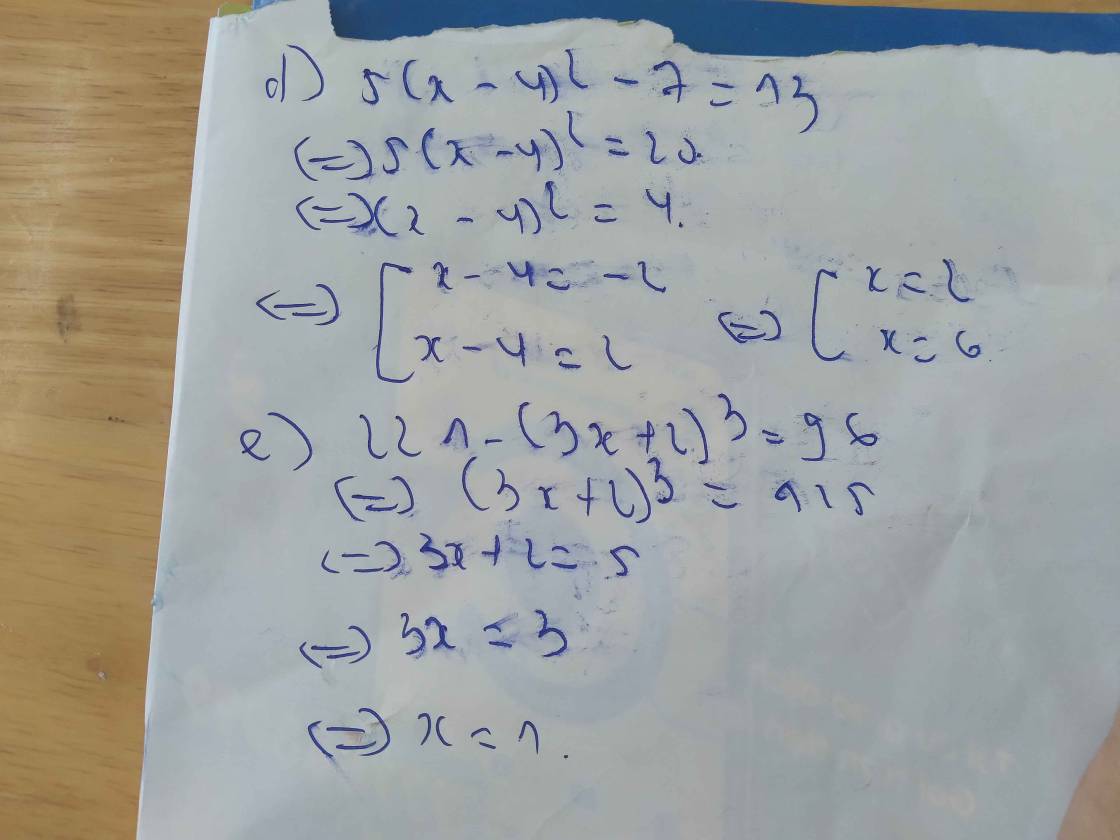Tính x: \(\left(2^x-8\right)^3+\left(4^x+13\right)^3=\left(4^x+2^x+5\right)^3\)

Những câu hỏi liên quan
Tìm x:8) 1-left(x-6right)4left(2-2xright)9)left(3x-2right)left(x+5right)010)left(x+3right)left(x^2+2right)011)left(5x-1right)left(x^2-9right)012)xleft(x-3right)+3left(x-3right)013)xleft(x-5right)-4x+20014)x^2+4x-50
Đọc tiếp
Tìm \(x\):
\(8\)) \(1-\left(x-6\right)=4\left(2-2x\right)\)
\(9\))\(\left(3x-2\right)\left(x+5\right)=0\)
\(10\))\(\left(x+3\right)\left(x^2+2\right)=0\)
\(11\))\(\left(5x-1\right)\left(x^2-9\right)=0\)
\(12\))\(x\left(x-3\right)+3\left(x-3\right)=0\)
\(13\))\(x\left(x-5\right)-4x+20=0\)
\(14\))\(x^2+4x-5=0\)
\(8,1-\left(x-6\right)=4\left(2-2x\right)\)
\(\Leftrightarrow1-x+6=8-8x\)
\(\Leftrightarrow-x+8x=8-1-6\)
\(\Leftrightarrow7x=1\)
\(\Leftrightarrow x=\dfrac{1}{7}\)
\(9,\left(3x-2\right)\left(x+5\right)=0\)
\(\Leftrightarrow\left[{}\begin{matrix}3x-2=0\\x+5=0\end{matrix}\right.\)
\(\Leftrightarrow\left[{}\begin{matrix}x=\dfrac{2}{3}\\x=-5\end{matrix}\right.\)
\(10,\left(x+3\right)\left(x^2+2\right)=0\)
\(\Leftrightarrow\left[{}\begin{matrix}x+3=0\\x^2+2=0\end{matrix}\right.\)
\(\Leftrightarrow\left[{}\begin{matrix}x=-3\\x=\varnothing\end{matrix}\right.\)
Đúng 2
Bình luận (0)
`8)1-(x-5)=4(2-2x)`
`<=>1-x+5=8-6x`
`<=>5x=2<=>x=2/5`
`9)(3x-2)(x+5)=0`
`<=>[(x=2/3),(x=-5):}`
`10)(x+3)(x^2+2)=0`
Mà `x^2+2 > 0 AA x`
`=>x+3=0`
`<=>x=-3`
`11)(5x-1)(x^2-9)=0`
`<=>(5x-1)(x-3)(x+3)=0`
`<=>[(x=1/5),(x=3),(x=-3):}`
`12)x(x-3)+3(x-3)=0`
`<=>(x-3)(x+3)=0`
`<=>[(x=3),(x=-3):}`
`13)x(x-5)-4x+20=0`
`<=>x(x-5)-4(x-5)=0`
`<=>(x-5)(x-4)=0`
`<=>[(x=5),(x=4):}`
`14)x^2+4x-5=0`
`<=>x^2+5x-x-5=0`
`<=>(x+5)(x-1)=0`
`<=>[(x=-5),(x=1):}`
Đúng 1
Bình luận (0)
\(11,=>\left[{}\begin{matrix}5x-1=0\\x^2-9=0\end{matrix}\right.=>\left[{}\begin{matrix}x=\dfrac{1}{5}\\x=3\\x=-3\end{matrix}\right.\\ 12,=>\left(x+3\right)\left(x-3\right)=0\\ =>\left[{}\begin{matrix}x+3=0\\x-3=0\end{matrix}\right.=>\left[{}\begin{matrix}x=-3\\x=3\end{matrix}\right.\\ 13,=>x\left(x-5\right)-4\left(x-5\right)=0\\ =>\left(x-4\right)\left(x-5\right)=0\\ =>\left[{}\begin{matrix}x-4=0\\x-5=0\end{matrix}\right.=>\left[{}\begin{matrix}x=4\\x=5\end{matrix}\right.\)
\(14,=>x^2+5x-x-5=0\\ =>x\left(x+5\right)-\left(x+5\right)=0\\ =>\left(x-1\right)\left(x+5\right)=0\\ =>\left[{}\begin{matrix}x-1=0\\x+5=0\end{matrix}\right.=>\left[{}\begin{matrix}x=1\\x=-5\end{matrix}\right.\)
Đúng 1
Bình luận (0)
Làm tính chia:
a) \(5^3:\left(-5\right)^2\)
b) \(\left(\dfrac{3}{4}\right)^5:\left(\dfrac{3}{4}\right)^3\)
c) \(\left(-12\right)^3-8^3\)
d) \(x^{10}:\left(-x\right)^8\)
e) \(\left(-x\right)^5:\left(-x\right)^3\)
f) \(\left(-y\right)^5:\left(-y\right)^4.\)
\(a,=5^3:5^2=5\\ b,=\left(\dfrac{3}{4}\right)^{5-3}=\left(\dfrac{3}{4}\right)^2=\dfrac{9}{16}\\ c,=1728-512=1216\\ d,=x^{10}:x^8=x^2\\ e,=\left(-x\right)^{5-3}=\left(-x\right)^2=x^2\\ f,=\left(-y\right)^{5-4}=-y\)
Đúng 1
Bình luận (0)
1) Cho đa thức \(f\left(x\right)=x^{14}-14.x^{13}+14.x^{12}-...+13.x^2-14.x+14\) Tính f(13)
2) Tính : \(\left(\dfrac{3}{4}-81\right)\left(\dfrac{3^2}{5}-81\right)\left(\dfrac{3^3}{6}-81\right)...\left(\dfrac{3^{2000}}{2003}-81\right)\)
Bài 2:
x=13 nên x+1=14
\(f\left(x\right)=x^{14}-x^{13}\left(x+1\right)+x^{12}\left(x+1\right)-...+x^2\left(x+1\right)-x\left(x+1\right)+14\)
\(=x^{14}-x^{14}-x^{13}+x^{13}-...+x^3+x^2-x^2-x+14\)
=14-x=1
Đúng 2
Bình luận (0)
x=13 nên x+1=14
f(x)=x14−x13(x+1)+x12(x+1)−...+x2(x+1)−x(x+1)+14f(x)=x14−x13(x+1)+x12(x+1)−...+x2(x+1)−x(x+1)+14
=x14−x14−x13+x13−...+x3+x2−x2−x+14=x14−x14−x13+x13−...+x3+x2−x2−x+14
=14-x=1
Đúng 1
Bình luận (0)
Tính A = \(\frac{1}{\left(x+1\right)\left(x+2\right)}+\frac{1}{\left(x+2\right)\left(x+3\right)}+\frac{2}{\left(x+3\right)\left(x+4\right)}+\frac{4}{\left(x+4\right)\left(x+5\right)}+\frac{8}{\left(x+5\right)\left(x+6\right)}\)
A= \(\frac{1}{x+1}-\frac{1}{x+2}+\frac{1}{x+2}-\frac{1}{x+3}+\frac{2}{x+3}-...+\frac{8}{x+5}-\frac{8}{x+6}\)
A=\(\frac{1}{x+1}+\frac{1}{x+3}+\frac{2}{x+4}+\frac{4}{x+5}-\frac{8}{x+6}\)
Rồi tiếp tục làm nhé bạn.
Đúng 0
Bình luận (0)
Giải các phương trình sau:
a) \(8 - \left( {x - 15} \right) = 2.\left( {3 - 2x} \right)\);
b) \( - 6\left( {1,5 - 2u} \right) = 3\left( { - 15 + 2u} \right)\);
c) \({\left( {x + 3} \right)^2} - x\left( {x + 4} \right) = 13\);
d) \(\left( {y + 5} \right)\left( {y - 5} \right) - {\left( {y - 2} \right)^2} = 5\).
a) \(8 - \left( {x - 15} \right) = 2.\left( {3 - 2x} \right)\)
\(8 - x + 15 = 6 - 4x\)
\( - x + 4x = 6 - 8 - 15\)
\(3x = - 17\)
\(x = \left( { - 17} \right):3\)
\(x = \dfrac{{ - 17}}{3}\)
Vậy nghiệm của phương trình là \(x = \dfrac{{ - 17}}{3}\).
b) \( - 6\left( {1,5 - 2u} \right) = 3\left( { - 15 + 2u} \right)\)
\( - 9 + 12u = - 45 + 6u\)
\(12u - 6u = - 45 + 9\)
\(u = \left( { - 36} \right):6\)
\(6u = - 36\)
\(u = - 6\)
Vậy nghiệm của phương trình là \(u = - 6\).
c) \({\left( {x + 3} \right)^2} - x\left( {x + 4} \right) = 13\)
\(\left( {{x^2} + 6x + 9} \right) - \left( {{x^2} + 4x} \right) = 13\)
\({x^2} + 6x + 9 - {x^2} - 4x = 13\)
\(\left( {{x^2} - {x^2}} \right) + \left( {6x - 4x} \right) = 13 - 9\)
\(2x = 4\)
\(x = 4:2\)
\(x = 2\)
Vậy nghiệm của phương trình là \(x = 2\).
d) \(\left( {y + 5} \right)\left( {y - 5} \right) - {\left( {y - 2} \right)^2} = 5\)
\(\left( {{y^2} - 25} \right) - \left( {{y^2} - 4y + 4} \right) = 5\)
\({y^2} - 25 - {y^2} + 4y - 4 = 5\)
\(\left( {{y^2} - {y^2}} \right) + 4y = 5 + 4 + 25\)
\(4y = 34\)
\(y = 34:4\)
\(y = \dfrac{{17}}{2}\)
Vậy nghiệm của phương trình là \(y = \dfrac{{17}}{2}\).
Đúng 1
Bình luận (0)
Tìm x:
1,left(3x-5right)^2-left(3x+1right)^28
2,2x.left(8x-3right)-left(4x-3right)^227
3,left(2x-3right)^2-left(2x+1right)^23
4, left(x+5right)^2-x^245
5, left(x-3right)^3-left(x-3right).left(x^2+3x+9right)+9.left(x+1right)^218
6,x.left(x-4right).left(x+4right)-left(x-5right).left(x^2+5x+25right)13
Đọc tiếp
Tìm x:
\(1,\left(3x-5\right)^2-\left(3x+1\right)^2=8\)
2,\(2x.\left(8x-3\right)-\left(4x-3\right)^2=27\)
3,\(\left(2x-3\right)^2-\left(2x+1\right)^2=3\)
4, \(\left(x+5\right)^2-x^2=45\)
5, \(\left(x-3\right)^3-\left(x-3\right).\left(x^2+3x+9\right)+9.\left(x+1\right)^2=18\)
6,\(x.\left(x-4\right).\left(x+4\right)-\left(x-5\right).\left(x^2+5x+25\right)=13\)
1. (3x - 5)2 - (3x + 1)2 = 8
=> (3x - 5 - 3x - 1)(3x - 5 + 3x + 1) = 8
=> -6(6x - 4) = 8
=> 6x - 4 = \(\dfrac{-4}{3}\)
\(\Rightarrow x=\dfrac{4}{9}\)
2) 2x(8x - 3) - (4x - 3)2 = 27
=> 16x2 - 6x - 16x2 + 24x - 9 = 27
=> 18x - 9 = 27
=> x = 2
3) (2x - 3)2 - (2x + 1)2 = 3
=> (2x - 3 - 2x - 1)(2x - 3 + 2x +1) = 3
=> -4(4x - 2) = 3
=> 4x - 2 = \(\dfrac{-3}{4}\)
\(\Rightarrow x=\dfrac{5}{16}\)
4) (x + 5)2 - x2 = 45
=> (x + 5 - x)(x + 5 + x) = 45
=> 5(2x + 5) = 45
=> 2x + 5 = 9
=> x = 2
5) (x - 3)3 - (x - 3)(x2 + 3x + 9) + 9(x + 1)2 = 18
=> x3 - 9x2 + 27x - 27 - x3 + 27 + 9(x2 + 2x + 1) = 18
=> -9x2 + 27x + 9x2 + 18x + 9 = 18
=> 45x + 9 = 18
=> 45x = 9
=> x = \(\dfrac{1}{5}\)
6) x(x - 4)(x + 4) - (x - 5)(x2 + 5x + 25) = 13
=> x (x2 - 16) - (x3 - 125) = 13
=> x3 - 16x - x3 + 125 = 13
=> -16x = -112
=> x = 7.
Đúng 0
Bình luận (1)
Tìm số tự nhiên x , biết
\(2\cdot\left(x-1\right)^2=8\)
\(\left(2x+1\right)^3=125\)
\(\left(x-2\right)^5=243\)
\(5\left(x-4\right)^2-7=13\)
\(221-\left(3x+2\right)^3=96\)
Giải phương trình: \(\left(2^x-8\right)^3+\left(4^x+13\right)^3=\left(4^x+2^x+5\right)^3\)
Đặt \(2^x-8=u;4^x+13=v\)
Phương trình trở thành \(u^3+v^3=\left(u+v\right)^3\)
\(\Rightarrow u^3+v^3=u^3+3uv\left(u+v\right)+v^3\)
\(\Rightarrow3uv\left(u+v\right)=0\)
*) \(u=0\Rightarrow2^x-8=0\Rightarrow x=3\)
\(v=0\Rightarrow4^x=-13\)(không tồn tại nghiệm thực)
\(u+v=0\Rightarrow2^x+4^x=-5\)(không tồn tại nghiệm thực)
Vậy nghiệm duy nhất của phương trình là 3
giải pt:
a,\(\left(13-4x\right)\sqrt{2x-3}+\left(4x-3\right)\sqrt{5-2x}=2+8\sqrt{-4x^2+16x-15}\)
b,\(\left(9x-2\right)\sqrt{3x-1}+\left(10-9x\right)\sqrt{3-3x}-4\sqrt{-9x^2+12x-3}=4\)
c, \(\left(6x-5\right)\sqrt{x+1}-\left(6x+2\right)\sqrt{x-1}+4\sqrt{x^2-1}=4x-3\)

























